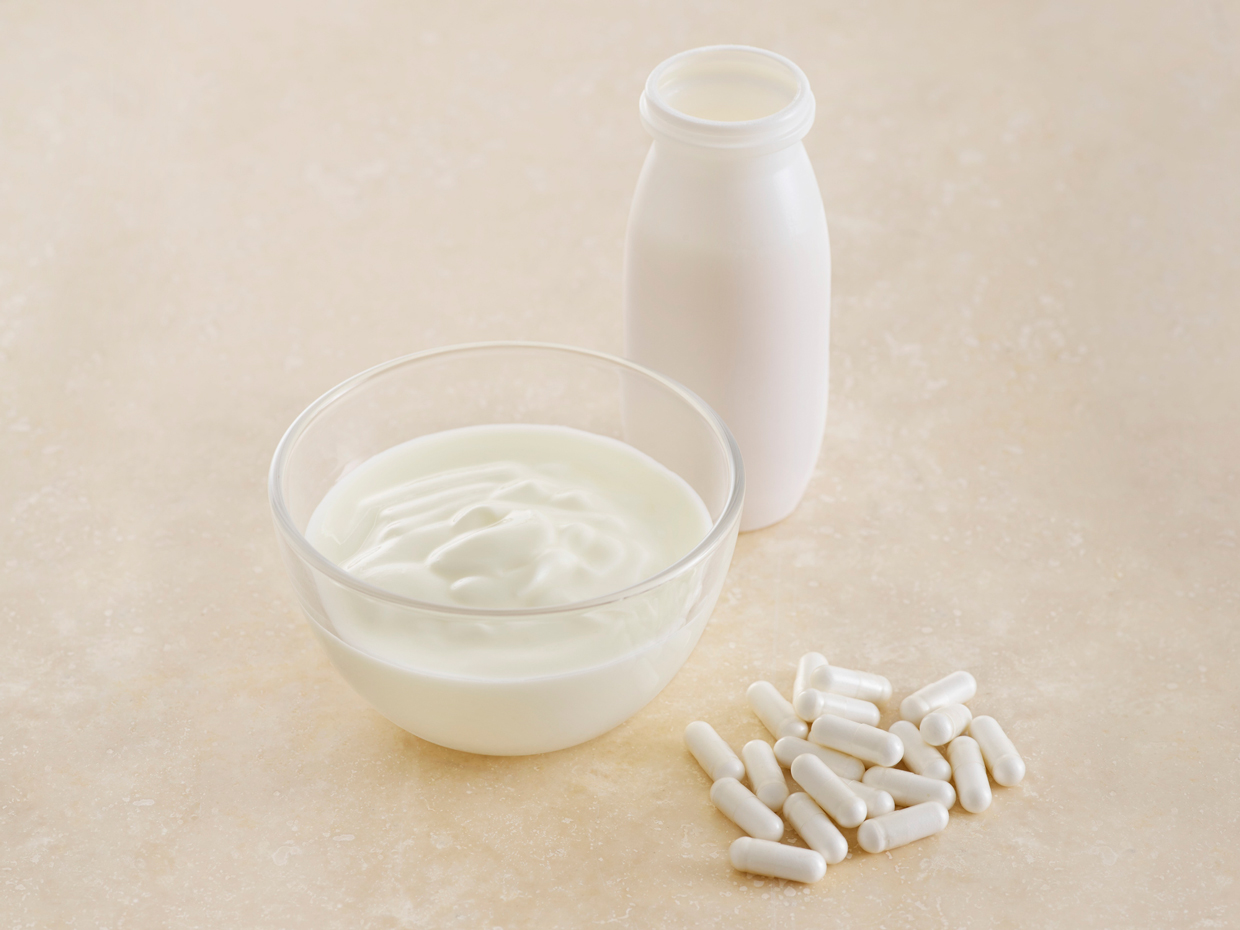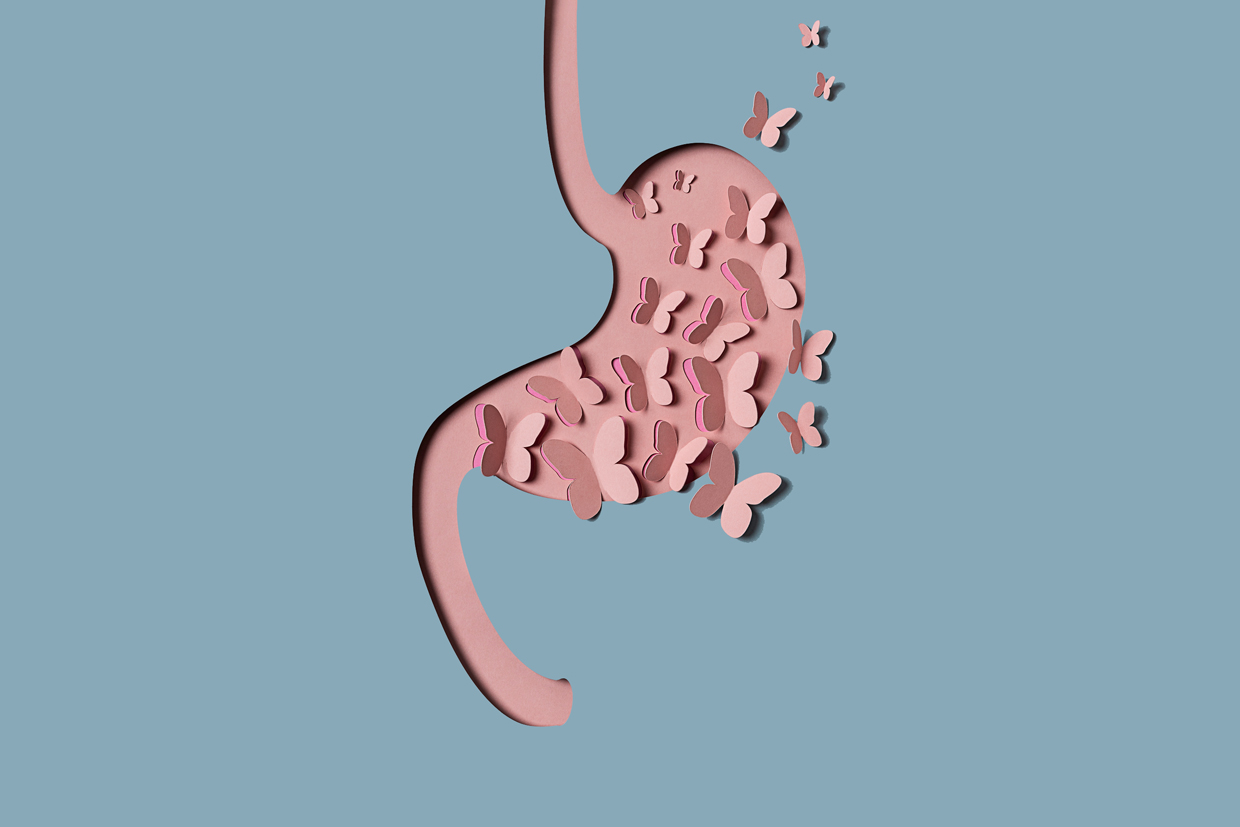When it comes to health, most of us are open to trying anything, especially amidst a global pandemic that threatens the very core of our wellness. While you can certainly enhance your health through a nutrient-rich diet and consistent exercise regimen, one component of complete health is through a healthy gut — something that is mainly achieved by ensuring you’re getting your fair share of probiotics.
Chances are, you’ve heard a lot about probiotics over the years, but may not fully grasp what they are — and what they do. Probiotics are various strains of live bacteria (yes, live!) and yeasts that can be beneficial for digestive health, explains certified holistic nutritionist Jennifer Hanway. “Consuming probiotics helps keep our digestive system healthy, balances out the good to bad bacteria in our microbiome (the population of bacteria that lives throughout our GI tract), and encourages diversity of healthy species of bacteria (a diverse microbiome is ideal for optimum health),” Hanway says. “Unfortunately, everything from our birth circumstances, to taking medications, our modern-day diets, and our stress levels can reduce the number of healthy bacteria in the microbiome.”

While you can get probiotics from certain foods like yogurt, tempeh, kimchi, sauerkraut and pickles, you can also take a probiotic supplement to ensure that you’re keeping your whole microbiome (the 10-100 trillion micro-organisms that live in your gut) healthy. The latter may actually be more beneficial, notes Lauren Manaker, M.S., R.D.N. with Nutrition Now Counseling. “Even though a food like a yogurt does contain live probiotics, if you are only eating one, say, every other week, you may not be taking in enough to offer a true benefit,” she warns. “If people are not eating probiotic-rich foods consistently, taking a supplement can be a great option to ensure adequate quantities are being taken in.”
Whether you choose to up your intake of probiotic-rich foods or opt for a probiotic supplement, here are 5 ways you can stand to benefit, according to nutrition pros.
Enhanced immunity
Did you know that 70 percent of your immune system is located in your gut? That means that the food you eat not only affects your digestive system, but also your immunity. Certain strains of probiotics can stimulate a part of our immune system, which in turn, can help us have a stronger immune system, explains Manaker. “While certain bacteria, like probiotics, are beneficial for your body, others, like e.coli, can cause gas and digestive issues,” she says. “As certain probiotics colonize the gut, they reduce the pH environment and create a more acidic environment in which potentially harmful e.coli cannot thrive.” If the bad bacteria can’t be sustained in your gut, you’re then left with more beneficial bacteria. Thanks, probiotics!
Lowered inflammation
Inflammation is a natural bodily process and one that’s actually beneficial because it protects your body from disease. But too much inflammation can actually be problematic, leading the body to think that it’s constantly under attack, explains Hanway. “Since most of the inflammatory response takes place in the gut, an unhealthy microbiome can cause pathogens and food particles to get into the bloodstream,” she says. “This then sets off an inflammatory response that can have negative effects throughout the body.”
Improved mental health
Did you know that 70 percent of your immune system is located in your gut?
You may have heard of the mind-gut connection. It’s a very real thing, and essentially explains the quite obvious connection between how we’re feeling, or our emotions, and our gut. Have you ever felt nervous about an interview or presentation and experienced a pit in the bottom of your stomach or maybe even nausea? Turns out, it wasn’t your imagination. Research has proven this connection between emotions and our gut. “More than 70 percent of serotonin, a neurotransmitter that helps us feel calm, relaxed and happy is made in the gut, so if our microbiome is not healthy then we will not be able to make adequate levels of this ‘happy’ hormone,” says Hanway. “Additionally, our digestive system has its own nervous system (with as many neurons as the brain) and is constantly sending messages back and forth to the brain and the rest of our body.”

Weight management
Maintaining a healthy weight is one of the best things you can do for your overall health, especially when it comes to preventing your risk of diseases, such as diabetes, heart disease, and certain types of cancer, per the Centers for Disease Control and Prevention (CDC).
While exercise and a healthy diet are two of the most fundamental weight-loss tools, so is getting your share of probiotics. “The bacteria in our microbiome have an impact on so many of our metabolic functions, including the number of calories we obtain from our food, and even the types of foods we crave,” says Hanway. In other words, taking a probiotic may help you cut back on unnecessary calories, thereby aiding in weight loss.
Digestion support
Probiotics also support healthy digestion, which is incredibly important because you literally are what you digest or absorb, not just what you eat, notes Josh Axe, D.N.M., C.N.S, D.C., founder of Ancient Nutrition, DrAxe.com and author of Ancient Remedies. “Every bodily cell, tissue and organ depends on proper nutrient absorption and assimilation of food through healthy digestion — and probiotics are key for proper digestion and absorption,” he adds.
Reduced risk of heart complications
Heart disease is the number one killer of both men and women in the United States, per the CDC, and is the cause of death of one person every 36 minutes. Luckily, probiotics can help keep your heart healthy by lowering your LDL (or “bad”) cholesterol levels. One study by the American Heart Association (AHA) analyzed 127 adults, half of which took a probiotic twice daily, while the other half were given placebos. After nine weeks, researchers found that the participants who took the probiotics had LDL levels that were 11.6 percent lower than those who took the placebo.
All in all, everyone can stand to benefit from probiotics. Knowing whether or not you should be supplementing is probably something that should be left up to your primary care provider who can go over your diet and lifestyle with you to determine what’s best.
We only recommend products we have independently researched, tested, and loved. If you purchase a product found through our links, Sunday Edit may earn an affiliate commission.







